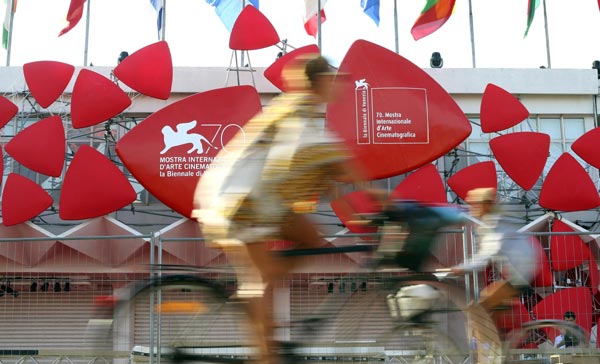

 |
|
People cycle in front of the Cinema Palace a day before the 70th Venice Film Festival in Venice August 27, 2013.[Photo/Agencies] |
VENICE, Italy -- The 70th Venice Film Festival is to start on Wednesday on the Lido island of Venice celebrating, in an era of challenges, the first time in history has a film festival has achieved this venerable age.
The festival promises a glamorous opening ceremony featuring several movie stars as well as Italy's authorities, and not least a variety of events aimed at boosting its commercial credentials on an increasingly competitive international scene.
A total of 20 titles are to compete for the top Golden Lion prize. The other three sections of the festival - Out of Competition, Orizzonti and Venezia Classici - look forward to offering a snapshot of the varied state of contemporary cinema.
The event, which runs from August 28 to September 7, will be inaugurated by world premiere of Mexican film director Alfonso Cuaron's "Gravity," starring Sandra Bullock and George Clooney, at the iconic Palazzo del Cinema, where the traditional Red Carpet was placed.
Compared with the previous years, Venice is striving to reinvent itself with new activities after in recent times it has faced quite many challenges especially from the imminent Toronto event, which is more commercially successful.
Moreover, compared to other international festivals such as Cannes and Berlin, the Lido seafront tends to be more expensive with limited infrastructure. Observers estimated an investment of at least 500,000 US dollars is necessary to take a movie of medium-big size to a festival, and many filmmakers think it is not worth the trouble to go to Venice: cinema attendance in Italy has reached 91 million spectators per year against the 200 million of France.
In order to help Venice go commercial, the festival's current director Alberto Barbera has embraced some new ideas keeping up with what he defined "economic complications, reduction of financial resources which once seemed almost unlimited, and new promotional strategies."
"We have tried to keep in mind the growing fragmentation" of the new potential offered by digital technology, new distribution and promotional platforms, he said ahead of the inauguration.
For example, documentaries are progressively gaining importance in the festival's scheduling, the director highlighted, to the point that two are participating in the competition for the first time ever, along with two experimental movies.
"One of them is Jiaoyou (Stray dogs) of Taiwan director Tsai Ming-liang, where there is only contemplation, and depth is inside the frame," Barbera said in an interview to a local newspaper.
"The image that you are forced to look for several minutes makes you find the density of the world, something that today's viewers are no longer used to doing," he went on to say.
There are shorts, a valuable training ground for the filmmakers of tomorrow, to which the Festival ascribes the same artistic dignity as feature films, while the Sala Web will offer the virtual audience of the web the opportunity to watch, in streaming, the films of the Orizzonti section simultaneously with their presentation.
The Film Market, another initiative created last year to encourage possible co-production partnerships and market access, was enlarged with more areas at the disposal of professionals including a project providing economic support for the post-production of four African movies.
Seventy filmmakers from all over the world were asked to make a micro-film lasting between 60 and 90 seconds to celebrate the festival's birthday, in the conviction that the past and the future of cinema need now more than ever to join hands.
Related:
Chinese-language films to be put on stage at Venice film festival